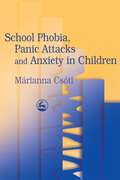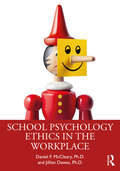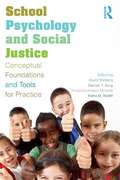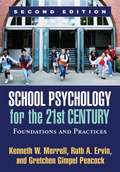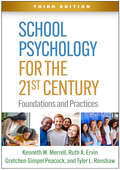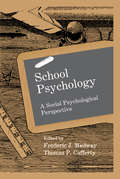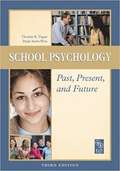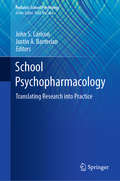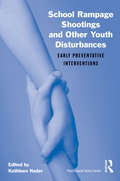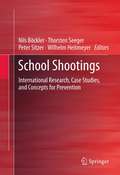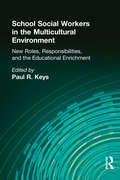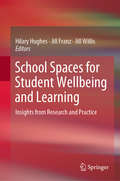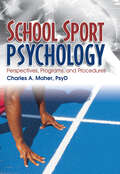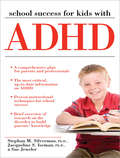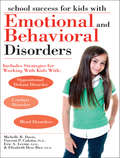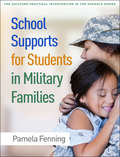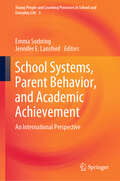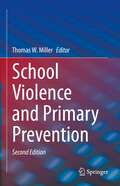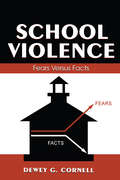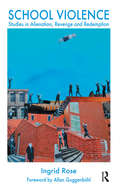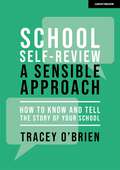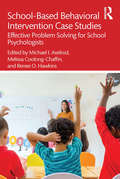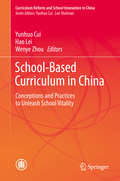- Table View
- List View
School Phobia, Panic Attacks and Anxiety in Children
by Marianna CsotiMany children are challenged by anxiety at some time in their school career. Bringing together knowledge from her years of teaching and parenting, Márianna Csóti shows how parents and professionals can help children aged five to sixteen move away from the negative thoughts and behaviour that contribute to school phobia. As well as tackling specific problems of bullying, separation anxiety, social phobia and panic attacks, the author provides information on current therapies and medication for the severely affected and on what to do if the child regresses. The advice can also be used to help guard against another sibling developing school phobia. This positive and practical book is packed with information and guidance for parents, carers, teachers and other child-support professionals, on dealing effectively with the difficulties of children whose lives are being adversely affected by this distressing and very real condition.
School Psychology Ethics in the Workplace
by Daniel F. McCleary Jillian DawesSchool Psychology Ethics in the Workplace introduces a pragmatic and user-friendly model that helps readers become proficient ethical decision-makers using the 2020 National Association of School Psychologists’ (NASP) ethical code and to critically engage the ethical standards and work through ethical dilemmas that often occur in school and clinical settings. This book provides an overview of NASP's latest Principles for Professional Ethics. It introduces readers to various ethical codes related to psychology, the importance of having ethical codes, the limitations of ethical codes, and an ethical decision-making model that accounts for multicultural and social justice issues. Over 100 ethical case studies are presented in the text that specifically relate to NASP’s Principles for Professional Ethics. Readers are provided step-by-step directions on how to use the ethical decision-making model when problem solving each case scenario. School psychology graduate students and their instructors will find this guide invaluable for learning NASP’s new ethical code and for being prepared for situations school psychologists are likely to experience in practice.
School Psychology and Social Justice: Conceptual Foundations and Tools for Practice
by David Shriberg Samuel Y. Song Antoinette Halsell Miranda Kisha M. RadliffSchool psychology practice does not exist in a vacuum and is not value-neutral. As the role and function of the school psychologist continues to evolve and expand, social justice provides a needed real-world framework for school psychology students, practitioners, supervisors, and professors to guide their efforts. Culled from years of experience by experts working in a vast array of applied environments and appropriate both for practitioners and for graduate courses in multicultural school psychology and/or the role and function of school psychologists, this book takes the reader through a tour of common school psychology topics and functions through the lens of social justice. Utilizing case examples and concrete suggestions, a critical yet hopeful vision of ways in which school psychologists can work to achieve positive outcomes for students, families, schools, and society is provided.
School Psychology for the 21st Century, Second Edition
by Kenneth W. Merrell Ruth A. ErvinA leading introductory text, this authoritative volume comprehensively describes the school psychologist's role in promoting positive academic, behavioral, and emotional outcomes for all students. The book emphasizes a problem-solving-based, data-driven approach to practice in today's diverse schools. It grounds the reader in the concepts and tools needed to become a competent, ethical practitioner; implement and evaluate multi-tiered interventions; and facilitate systems-level change. Useful pedagogical features include illustrative vignettes and end-of-chapter discussion questions and activities. New to This Edition *Incorporates up-to-date research findings and professional standards. Expanded coverage of response to intervention, cultural and linguistic diversity issues, and evidence-based practice in mental health. Chapter on legal issues includes expanded coverage of IDEIA and other recent federal mandates.
School Psychology for the 21st Century, Third Edition: Foundations and Practices
by Kenneth W. Merrell Ruth A. Ervin Gretchen Gimpel Peacock Tyler L. RenshawNow in a revised and updated third edition reflecting a decade of changes in the field, this leading text prepares new practitioners to support all students' academic, behavioral, and social–emotional success. The multiple roles and functions of the school psychologist are described and illustrated with vivid vignettes. Readers gain vital skills for planning and implementing evidence-based prevention and intervention efforts and collaborating to facilitate systems change. Guided by a problem-solving perspective, the book provides tools for effective, culturally responsive practice in today's diverse schools. End-of-chapter discussion questions and activities enhance learning. New to This Edition *Incorporates key advances in evidence-based assessment, intervention, and multi-tiered systems of support. *Increased attention to supporting the growing numbers of culturally and linguistically diverse students in schools. *Addresses changes in school psychology training programs and professional standards. *New emphasis on implementation science.
School Psychology: A Social Psychological Perspective (School Psychology Series)
by Frederic J. Medway Thomas P. CaffertyThis impressive volume reintroduces the importance of -- and the contributions made by -- social psychology to school psychology. It provides an overview of the basic areas of social psychology (history, attitudes, attribution, attraction, and research methods) as well as the traditional school psychology functions (assessment, therapy, and consultation). To unite these two crucial areas, the editors and their contributors provide detailed discussions of specific educational and social issues such as substance abuse prevention and treatment, loneliness, cooperative versus competitive environments, and integration of handicapped and culturally different children. Based on classical, contemporary, and cutting-edge research and theory, this text should become an essential reference tool for all school psychologists.
School Psychology: Past, Present, and Future (3rd Edition)
by Thomas Fagan Paula WiseFor over 10 years, School Psychology: Past, Present, and Future has served as the premiere school psychology text utilized by educators and students. In this newest edition, trainers and students are provided with a detailed overview of issues relevant to the history, current status, and future of the profession of school psychology. Introductions to subsequent courses including special education, assessment interventions, and field experiences are also featured.
School Psychopharmacology: Translating Research into Practice (Pediatric School Psychology)
by John S. Carlson Justin A. BarterianThis book provides a research-based overview of the use of psychotropic medications in combination with psychosocial interventions to improve learning, social interactions, and behavioral functioning of children within the school setting. It details implementation strategies for delivering multimodal treatments to school-aged children with psychiatric diagnoses while coordinating services across educational and health service sectors. In addition, it includes case studies on ADHD, conduct disorder, depression, social anxiety, autism spectrum disorder, bipolar disorder, and psychosis, with overviews of treatment plans, targeted goals and behaviors, classroom-based medication evaluation plans, and treatment responses communicated back to the child’s family and physician. The book concludes with an overview of integrated behavioral health and the benefits of care coordination to school-aged children experiencing social, emotional, and behavioral challenges. Topics featured in this text include:Legal, ethical, and professional issues related to the use of psychotropic medications in school-aged populations.Effective medications for treating mood dysregulation disorders in school-aged youth.Medications for internalizing and externalizing disorders.Common side effects of psychotropic medication in school-aged populations.The need to be culturally sensitive when considering treatment plans for school-aged youth. School Psychopharmacology is an essential resource for researchers, graduate students, and other professionals in child and school psychology, social work, psychiatry, psychopharmacology, special and general education, public health, and counseling.
School Rampage Shootings and Other Youth Disturbances: Early Preventative Interventions (Psychosocial Stress Series)
by Kathleen NaderTogether, School Rampage Shootings and Other Youth Disturbances and its accompanying CD provide a complete toolkit for using early preventative interventions with elementary-school age children. In ten thoughtful, clearly written chapters, both new and experienced practitioners will find a wealth of research- and evidence-based techniques that link personal child and childhood environmental conditions to a number of symptoms, disturbances, and disorders in youth or adulthood, including the expression of rampage violence. In the second part of this indispensable collection – the accompanying CD – practitioners will find worksheets and handouts that translate useful techniques into reality and are sure to make any practice come alive.
School Shootings
by Wilhelm Heitmeyer Thorsten Seeger Peter Sitzer Nils BöcklerSchool shootings are a topic of research in a variety of different disciplines--from psychology, to sociology to criminology, pedagogy, and public health--each with their own set of theories. Many of these theories are logically interconnected, while some differ widely and seem incompatible with each other, leading to divergent results about potential means of prevention. In this innovative work, leading researchers on the topic of school shootings introduce their findings and theoretical concepts in one combined systematic volume. The contributions to this work highlight both the complementary findings from different fields, as well as cases where they diverge or contradict each other. The work is divided into four main sections: an overview of current theoretical approaches and empirical models; application of these theories to international cases, including Columbine (USA), Emsdetten (Germany), and Tuusula (Finland); a critique of the influence of the media, both in the portrayals of past events and its effect on future events; and finally an overview of existing models for prevention and intervention, and measures of their success. The result is a comprehensive source for current research on school shootings, and will provide a direction for future research.
School Social Workers in the Multicultural Environment: New Roles, Responsibilities, and Educational Enrichment
by Paul R KeysSchool Social Workers in the Multicultural Environment is a new approach for creating diversity in classroom and field curricula. The contributing authors offer practical advice for the effective teaching of multicultural content, which is now a requirement in the Curriculum Standards of the Council on Social Work Education. The authors address existing fears some readers may have regarding the teaching of multicultural content in social work and provide educators and field instructors with a model for overcoming these fears and for creating classroom excellence. Multicultural Education offers educators a chance to explore how to implement the required material effectively.While offering guidance to educators, School Social Workers in the Multicultural Environment focuses on fundamental and controversial approaches to multicultural social work education by answering these questions: Do educators know how to teach multicultural social work content? Where should multicultural content be taught? Should schools offer courses or workshops to facilitate faculty development? How should schools monitor multicultural outcomes? In what way should content be evaluated--peer evaluation, formal teaching observations, or other methods?School Social Workers in the Multicultural Environment, written by experienced educators, field instructors, and practitioners, provides advice on the teaching of multicultural social work content in both urban and rural areas and among many different populations. The book examines in depth the unspoken myths and fears encountered in teaching multiculturalism to students and helps educators and curriculum planners avoid common, unfortunate mistakes often made in multicultural classrooms and field instruction. Topics discussed include: Student Learning Processes for Multicultural Content Classroom-Tested Teaching Strategies for Cultural Competence in Practice Classes A Model for Measuring Multicultural Outcomes Perceived Racism and Minority Student Retention Differing Student and Educator Perceptions in Field Instruction Field Instruction Strategies for Successfully Teaching Cultural, Ethnic, Gender, Class, and Age Characteristics Rural Diversity Education Strategies American Indian Social Work Student Issues Human services educators and curriculum planners, who must effectively teach and implement multiculturalism in their programs, will find School Social Workers in the Multicultural Environment leads the way in creating classroom excellence. It stresses the importance of creating a new model for teaching and practice, for students and educators.
School Spaces for Student Wellbeing and Learning: Insights from Research and Practice
by Hilary Hughes Jill Franz Jill WillisThis book introduces a new wellbeing dimension to the theory and practice of learning space design for early childhood and school contexts. It highlights vital, yet generally overlooked relationships between the learning environment and student learning and wellbeing, and reveals the potential of participatory, values-based design approaches to create learning spaces that respond to contemporary learners’ needs. Focusing on three main themes it explores conceptual understandings of learning spaces and wellbeing; students’ lived experience and needs of learning spaces; and the development of a new theory and its practical application to the design of learning spaces that enhance student wellbeing. It examines these complex and interwoven topics through various theoretical lenses and provides an extensive, current literature review that connects learning environment design and learner wellbeing in a wide range of educational settings from early years to secondary school. Offering transferable approaches and a new theoretical model of wellbeing as flourishing to support the design of innovative learning environments, this book is of interest to researchers, tertiary educators and students in the education and design fields, as well as school administrators and facility managers, teachers, architects and designers.
School Sport Psychology: Perspectives, Programs, and Procedures (Published Simultaneously As The Journal Of Applied School Psychology, Vol. 21, No. 2 Ser.)
by Charles A MaherFind out how-and why-sports can help you better understand your studentsBecause participation in sports is an integral part of the educational experience for students in both public and private schools, it&’s essential that school psychologists and counselors have a solid foundation to help ensure the well-being of student-athletes. School Sport Psychology is a comprehensive overview of this fast-growing field with guidelines for school psychologists who want to gain a better understanding of sport psychology to extend their skills and enhance their effectiveness. The book presents perspectives, programs, and procedures for working with administrators and coaches to help students develop physically, mentally, and emotionally.School Sport Psychology examines the practical interfaces between school and sport psychology, with an emphasis on parent and family involvement. Contributors representing sport psychology, school psychology, and clinical and community disciplines examine the theory, research, and practice of sport psychology and how its evolution parallels the development of school psychology. The book addresses the benefits and risks of using sport to promote the development of self-esteem, identity, and feelings of competence in students. School Sport Psychology examines: evidence-based sport psychology programs, including GOALS, ATLAS, and ATHENA a case study of the design and implementation of a sport psychology program in an urban high school the use and abuse of alcohol and other drugs among high school student-athletes the use and abuse of steroids eating disorders among high school student-athletes a systems-oriented method of school/sport psychology assessment and intervention program planning and evaluation framework the knowledge and skills needed to work in sport psychology and much moreSchool Sport Psychology is an essential professional resource for psychologists, counselors, and health service providers.
School Success for Kids with ADHD
by Sue Jeweler Stephan M. Silverman Jacqueline S. IsemanTwo clinical psychologists and a K-12 teacher authored this text offering parents and teachers a clinical perspective on ADHD and strategies to manage its effect on study. Early chapters discuss how the disorder has been viewed historically and the importance of attention in academics. The authors go on to propose a multimodal management plan that involves assessment, medical monitoring, case management, educational supports, parental involvement, attention to the patient's diet, calming and relaxation techniques, and counseling, among other interventions. Also covered are best practices for teachers, support for ADHD patients in college, the role of technology in managing ADHD, and a review of alternative treatments parents can consider. Appendices contain supplementary tools for use with ADHD patients and a research summary. Annotation ©2009 Book News, Inc., Portland, OR (booknews.com)
School Success for Kids with Emotional and Behavioral Disorders
by Michelle R. DavisSchool Success for Kids With Emotional and Behavioral Disorders gives parents and teachers of students with conduct disorder, oppositional defiant disorder, mood disorders, or other emotional and behavioral disorders the strategies they need to help these kids overcome their struggles and find success in school. Based on the experiences of psychologists and educators working with kids with these disorders, this book provides help for children needing to control their emotional outbursts and strategies to teach kids to monitor, review, and change their behaviors.
School Supports for Students in Military Families (The Guilford Practical Intervention in the Schools Series)
by Pamela FenningHow does growing up in a military family affect the educational experiences of children and youth? What can K–12 school practitioners do to support these students' academic, behavioral, and social-emotional success? This book describes effective ways to help students and their families navigate such challenges as relocation, school transitions, and parental deployment. Pamela Fenning presents strengths-based assessment, intervention, and prevention strategies that reflect deep knowledge of military culture and fit perfectly within a schoolwide multi-tiered system of support (MTSS). In a convenient large-size format, the book includes a reproducible data collection form that can be downloaded and printed for repeated use. This book is in The Guilford Practical Intervention in the Schools Series, edited by Sandra M. Chafouleas.
School Systems, Parent Behavior, and Academic Achievement: An International Perspective (Young People and Learning Processes in School and Everyday Life #3)
by Emma Sorbring Jennifer E. LansfordThis volume takes an international and multidisciplinary approach to understanding students’ academic achievement. It does so by integrating educational literature with developmental psychology and family studies perspectives. Each of the nine chapters focuses on a particular country: China, Colombia, Italy, Jordan, Kenya, the Philippines, Sweden, Thailand, or the United States. It describes the country as a cultural context, examines the current school system and parenting in light of the school system, and provides empirical evidence from that country regarding links between parenting and students’ academic achievement. The book highlights similarities and differences in education and parenting across these nine countries - all varying widely in socioeconomic and cultural factors that affect schools and families. The volume contributes to greater understanding of links between parenting and academic performance in different cultural groups. It sheds light on how school systems and parenting are embedded in larger cultural settings that have implications for students’ educational experiences and academic achievement. As two of the most important contexts in which children and adolescents spend time, understanding how schools and families jointly contribute to academic achievement holds promise for advancing the international agenda of promoting quality education for all.
School Violence and Primary Prevention
by Thomas W. MillerThis important new work covers clinical issues in treating victims of school violence and assessing children with the potential for violence. The editor also examines the effectiveness of prevention intervention programs and offers larger policy recommendations. The book looks at environmental factors such as cultural issues on behaviors from bullying to mass school shootings. And uniquely, the book delves into topics such as sexual boundaries and body image. In all, this book aims for a theoretical and applied picture of the current state of school violence and prevention.
School Violence: Fears Versus Facts
by Dewey G. CornellIllustrated with numerous case studies–many drawn from the author’s work as a forensic psychologist–this book identifies 19 myths and misconceptions about youth violence, from ordinary bullying to rampage shootings. It covers controversial topics such as gun control and the effects of entertainment violence on children. The author demonstrates how fear of school violence has resulted in misguided, counterproductive educational policies and practices ranging from boot camps to zero tolerance. He reviews evidence from hundreds of controlled studies showing that school-based school violence prevention programs and mental health services, which are largely effective, are often overlooked in favor of politically popular yet ineffective programs such as school uniforms, Drug Abuse Resistance Education, and Scared Straight. He concludes by reviewing some of his own research on student threat assessment as a more flexible and less punitive alternative to zero tolerance, and presents a wide ranging series of recommendations for improving and expanding the use of school-based violence prevention programs and mental health services for troubled students. Key features include the following: Contrarian Approach–This book identifies and refutes 19 basic misconceptions about trends in youth violence and school safety, and shows how the fear of school violence has been exaggerated through inaccurate statistics, erroneous conclusions about youth violence, and over-emphasis on atypical, sensational cases. Readability–The book translates scientific, evidence-based research into language that educators, parents, law enforcement officers, and policymakers can readily understand and shows what can be done to improve things. Expertise–Dewey Cornell is a forensic psychologist and Professor of Education at the University of Virginia, where he holds an endowed chair in Education. He is Director of the UVA Youth Violence Project and is a faculty associate of the Institute of Law, Psychiatry, and Public Policy. The author of more than 100 publications in psychology and education, he frequently testifies in criminal proceedings and at legislative hearings involving violence prevention efforts. This book is appropriate for courses or seminars dealing wholly or partly with school violence and school safety. It is also an indispensable volume for school administrators and safety officers; local, state, and national policymakers; involved parents; and academic libraries serving these groups.
School Violence: Studies in Alienation, Revenge and Redemption
by Ingrid RoseExperiences of violence in schools are encountered much more frequently than they used to be. The shocking repercussions of these acts are felt nation-wide and particularly impact school populations, families and communities. This book undertakes to illuminate factors pertaining to the phenomenon of school violence. It is intended for professionals such as school principals, teachers, social workers, psychologists, school administrators, school counselors and all who work directly with youth in various contexts. It is also intended for parents, family and community members, youth advisors and mentors, youth group leaders, religious advisors, counsellors, and others interested in the wellbeing of children and adolescents.
School mental health
by Mark D. Weist Kutcher, Stan and Wei, Yifeng and Weist, Mark D. Stan Kutcher Yifeng WeiThe realisation that most mental disorders have their onset before the age of twenty-five has focused psychiatric research towards adolescent mental health. This book provides vivid examples of school mental health innovations from eighteen countries, addressing mental health promotion and interventions. These initiatives and innovations enable readers from different regions and disciplines to apply strategies to help students achieve and maintain mental health, enhance their learning outcomes and access services, worldwide. Through case studies of existing programs, such as the integrated system of care approach in the USA, the school-based pathway to care framework in Canada, the therapeutic school consultation approach in Turkey and the REACH model in Singapore, it highlights challenges and solutions to building initiatives, even when resources are scarce. This will be essential reading for educators, health providers, policy makers, researchers and other stakeholders engaged in helping students achieve mental health and enhance their learning outcomes.
School self-review – a sensible approach: How to know and tell the story of your school
by Tracey O'BrienThis book looks at the sensible and meaningful role of self-review in creating sustainable improvement in all areas across secondary schools. It outlines a self-review approach focussed on key principles which ensure this approach is transparent, purposeful, does not negatively impact on workload, that does not use the same approach for all teams and that does actually result in clear ideas for school improvement. It discusses claims of effective self-review including that it challenges thinking, leads to improvement, incorporates a range of stakeholders, skills people up, and helps build professional communities.The book is full of examples and case studies so that the reader can transfer some of these ideas to their context, discuss them at meetings and help generate new ideas. It challenges the 'deep dive' approach as something that should be left to Ofsted and instead suggests that leaders should know daily what is happening in their schools, and instead work with staff to design self-review activities that are bespoke and fit for purpose.The main theme is around 'improve not prove', where stakeholders feel involved, valued and empowered to be change-makers at a range of scales. It examines how effective self-review can reduce workload and support improvements in wellbeing.
School self-review – a sensible approach: How to know and tell the story of your school
by Tracey O'BrienThis book looks at the sensible and meaningful role of self-review in creating sustainable improvement in all areas across secondary schools. It outlines a self-review approach focussed on key principles which ensure this approach is transparent, purposeful, does not negatively impact on workload, that does not use the same approach for all teams and that does actually result in clear ideas for school improvement. It discusses claims of effective self-review including that it challenges thinking, leads to improvement, incorporates a range of stakeholders, skills people up, and helps build professional communities.The book is full of examples and case studies so that the reader can transfer some of these ideas to their context, discuss them at meetings and help generate new ideas. It challenges the 'deep dive' approach as something that should be left to Ofsted and instead suggests that leaders should know daily what is happening in their schools, and instead work with staff to design self-review activities that are bespoke and fit for purpose.The main theme is around 'improve not prove', where stakeholders feel involved, valued and empowered to be change-makers at a range of scales. It examines how effective self-review can reduce workload and support improvements in wellbeing.
School-Based Behavioral Intervention Case Studies: Effective Problem Solving for School Psychologists
by Michael I. Axelrod Melissa Coolong-Chaffin Renee O. HawkinsSchool-Based Behavioral Intervention Case Studies translates principles of behavior into best practices for school psychologists, teachers, and other educational professionals, both in training and in practice. Using detailed case studies illustrating evidence-based interventions, each chapter describes all the necessary elements of effective behavior intervention plans including rich descriptions of target behaviors, detailed intervention protocols, data collection and analysis methods, and tips for ensuring social acceptability and treatment integrity. Addressing a wide array of common behavior problems, this unique and invaluable resource offers real-world examples of intervention and assessment strategies.
School-Based Curriculum in China: Conceptions and Practices to Unleash School Vitality (Curriculum Reform and School Innovation in China)
by Yunhuo Cui Hao Lei Wenye ZhouThis book first develops a framework to understand the curriculum administration system in China. It describes the historical process of localizing school-based curricula as well as the significance and positioning of school-based curricula, and presents in detail cases of how three types of school-based curriculum were developed and implemented in Chinese schools.The book outlines for the first time best practices in school-based curriculum development in China, i.e. how to make a holistic curriculum plan, how to design a curriculum, and how to develop a course in the context of a school-based curriculum. By discussing these three aspects, it clearly summarizes the strategies and technologies for school-based curriculum development, which are applicable across contexts.Although the concept originated outside China, school-based curriculum development in China differs from that in other countries both in theory and practice. This book equips readers with theoretical and practical knowledge of how to develop school-based curricula and how to generate experiences for new curriculum development.This timely book is a valuable resource for researchers, curriculum designers, school teachers and others who are interested in school-based curriculum development.
